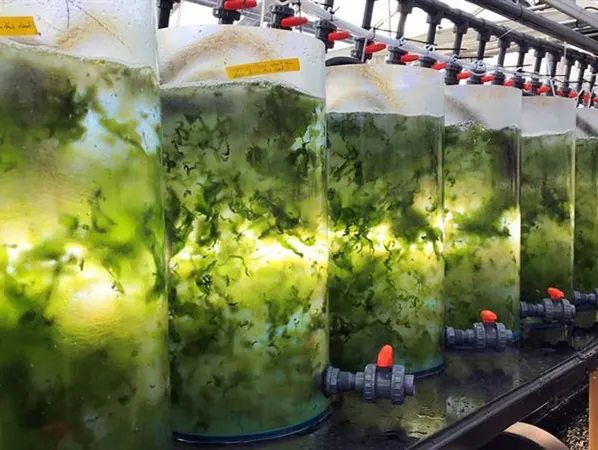
The Future of Food: Seaweed Proteins Set to Revolutionize Our Plates!
2024-11-14
Author: John Tan
Introduction
Seaweed, particularly sea lettuce, is emerging as a powerhouse ingredient that could soon complement traditional meats and popular plant-based protein sources. Known scientifically as Ulva fenestrata, this nutrient-dense macroalga flourishes in various marine environments without the need for freshwater, fertilizers, or pesticides. Yet, until recently, the extraction of its proteins had been inefficient, limiting its widespread culinary application. A groundbreaking study from Chalmers University of Technology in Sweden unveils a revolutionary method for efficiently extracting these proteins, potentially leading to the rise of innovative food products such as seaweed burgers and protein-rich smoothies.
Flavor Profile
PhD researcher Joâo Trigo noted, "The flavor profile is reminiscent of umami with hints of saltiness, despite its low sodium content. It's an exceptional flavor enhancer for seafood dishes, but the culinary possibilities are genuinely limitless, from protein shakes to 'blue burgers' crafted from the ocean’s bounty."
Sustainable Protein Shift
As the food industry pushes for a sustainable transition—often termed the "protein shift"—there is a growing interest in moving away from red meats towards more environmentally friendly alternatives. While sources like soy, pea, and mushroom have made their mark, the nutrient-rich options lurking beneath the waves remain largely untapped. Seaweed could be our next culinary frontier.
Innovative Extraction Method
The CirkAlg project at Chalmers focuses on harnessing seaweed as a sustainable protein source, and their latest study highlights an innovative extraction method yielding three times more protein than previous techniques. "This breakthrough brings us closer to making seaweed protein comparable in affordability to pea and soy proteins," Trigo explained.
Nutritional Benefits
Moreover, sea lettuce doesn’t just provide protein; it’s packed with vital nutrients like vitamin B12 and omega-3 fatty acids typically found in fish. This is crucial for vegans and vegetarians, as vitamin B12 is essential for red blood cell formation and is commonly deficient in those avoiding animal products. The advantages of seaweed cultivation are substantial: it thrives in varying conditions and contributes to sustainable food production without the drawbacks of terrestrial farming.
Need for Dietary Evolution
Ingrid Undeland, Professor of Food Science at Chalmers, emphasized the need for dietary evolution: “To meet growing sustainability and nutritional demands, we must diversify our protein sources. Sea-based options, often referred to as blue proteins, have been overlooked." The research team is also collaborating with the University of Gothenburg to enhance sea lettuce's protein content by using industrial process water, ensuring nutrients are recycled back into the food chain, thus minimizing waste.
Maximizing Sustainability
Additionally, the research aims to utilize other parts of algae for applications beyond food, potentially revolutionizing materials and medical uses. "We're focused on ensuring no molecules go to waste, maximizing both sustainability and commercial opportunities," Undeland said.
Extraction Method Overview
The extraction method itself tackles the complexity of seaweed proteins, which include both water-soluble and fat-soluble types. Initially, the cell membranes of the sea lettuce are opened, allowing further extraction through pH manipulation. The result is a protein-rich ingredient that not only surpasses soy protein in potential nutritional benefits but also retains beneficial omega-3 fatty acids and vitamin B12, addressing a broader spectrum of dietary needs.
Conclusion
The study detailing these findings can be found in *Food Chemistry*, illustrating a pivotal moment in food science. As the world looks towards greener, more sustainable food sources, seaweed could hold the key to a healthier and more sustainable future on our plates. Buckle up for the wave of change in our diets!




 Brasil (PT)
Brasil (PT)
 Canada (EN)
Canada (EN)
 Chile (ES)
Chile (ES)
 España (ES)
España (ES)
 France (FR)
France (FR)
 Hong Kong (EN)
Hong Kong (EN)
 Italia (IT)
Italia (IT)
 日本 (JA)
日本 (JA)
 Magyarország (HU)
Magyarország (HU)
 Norge (NO)
Norge (NO)
 Polska (PL)
Polska (PL)
 Schweiz (DE)
Schweiz (DE)
 Singapore (EN)
Singapore (EN)
 Sverige (SV)
Sverige (SV)
 Suomi (FI)
Suomi (FI)
 Türkiye (TR)
Türkiye (TR)